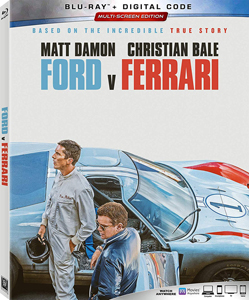Aside from its wonderful locations and car designs that capture the 1960s, director James Mangold’s “Ford v Ferrari” (2019) is a sober re-creation of a niche slice of history. He trusts that 24-hour racing at Le Mans and Daytona will be exciting enough to capture and hold the layperson’s attention.
He pushes it with the 2-hour, 32-minute run time, but ultimately he’s right. While non-racing-fan moviegoers aren’t likely to tune in to TV coverage of the next 24-race, this sport plays tremendously well in movie form.
Inside the garage
Home viewers with Atmos sound systems will especially enjoy the races, and even the sequences where scruffy mechanic/racer Ken Miles (Christian Bale with a brogue that almost requires subtitles) is merely testing cars. The visuals are often spectacular, too, with cinematographer Phedon Papamichael notably drawing mood out of a storm-struck portion of the climactic Le Mans race.

“Ford v Ferrari” (2019)
Director: James Mangold
Writers: Jez Butterworth, John-Henry Butterworth, Jason Keller
Stars: Matt Damon, Christian Bale, Jon Bernthal
“Ford v Ferrari” is structurally the underdog story of Ford – a commercial auto manufacturer till then — challenging Ferrari’s supremacy in the racing world. But it’s not a clichéd underdog story that puts the American company on a pedestal. In fact, “FvF” portrays most of the Ford brass in a negative light, flat-out making fun of Henry Ford II (Tracy Letts) when Carroll Shelby (Matt Damon, plus a Southern twang) insists on taking the boss on a test ride he knows the man can’t handle.
Josh Lucas’ Leo Beebe is a sniveling middleman, and Jon Bernthal’s Lee Iacocca fades away from the narrative. The only Ford employees we like are the hired guns – retired driver-turned-designer Shelby and his trusted second-in-command and driver Miles. Yes, Italy’s Ferrari is the villainous company, as established by a funny scene (the whole film has a slightly playful vibe, even when serious) wherein Enzo Ferrari (Remo Girone) rejects Ford’s offer of a merger with vulgarity that needs no translation.
But writers Jez Butterworth, John-Henry Butterworth and Jason Keller do a clever thing wherein we are sucked into the yarn without caring that Ford defeats Ferrari. Or rather, we don’t care that Ford as a company wins. We just want Shelby and Miles to win. Or perhaps merely to get to build and race cars for a living.
Because, for all its other trappings, “FvF” is a friendship story. In an early scene, Miles throws a wrench at Shelby, but – without taking a moment (except at the very end) to say it – we gradually realize these guys are the best of buddies.
Miles to go
Miles’ family life is also nicely drawn, with Caitriona Balfe as wife Mollie and Noah Jupe as son Peter. In a refreshing twist on the cinematic marital clash, Mollie knows her husband. She doesn’t beg him to switch to a safe career. So when Ken quits with the idea of getting a steady and normal job, Mollie doesn’t accept it: She doesn’t want to be around him when he’s miserable, not doing the thing he loves.

And that’s the weirdly dark undercurrent to this otherwise upbeat movie: Ken and Carroll need to race. It’s in their blood. They know it can get them killed, and the audience knows it too. These thrilling 1960s races take place with the driver protected by a helmet and a flame-retardant suit – but that suit only works if the driver can get out of the car quickly, otherwise he’ll die. And these are the types of cars that can have bizarre race-day glitches such as the door not working.
“FvF” makes a remarkably strong case that we shouldn’t feel saddened by the death of someone who dies doing what they love. Throw in the sounds of shaking nuts and bolts, and there’s more than a little overlap between astronauts and race car drivers. (“First Man” comes to mind when I think of how “FvF’s” sound design illustrates the danger.)
But, more than the sound and speed and lovable performances by Damon and Bale, the most impressive thing about “Ford v Ferrari” is that it makes its subtle yet powerful points about friendship and occupational drive without easing off the gas.

